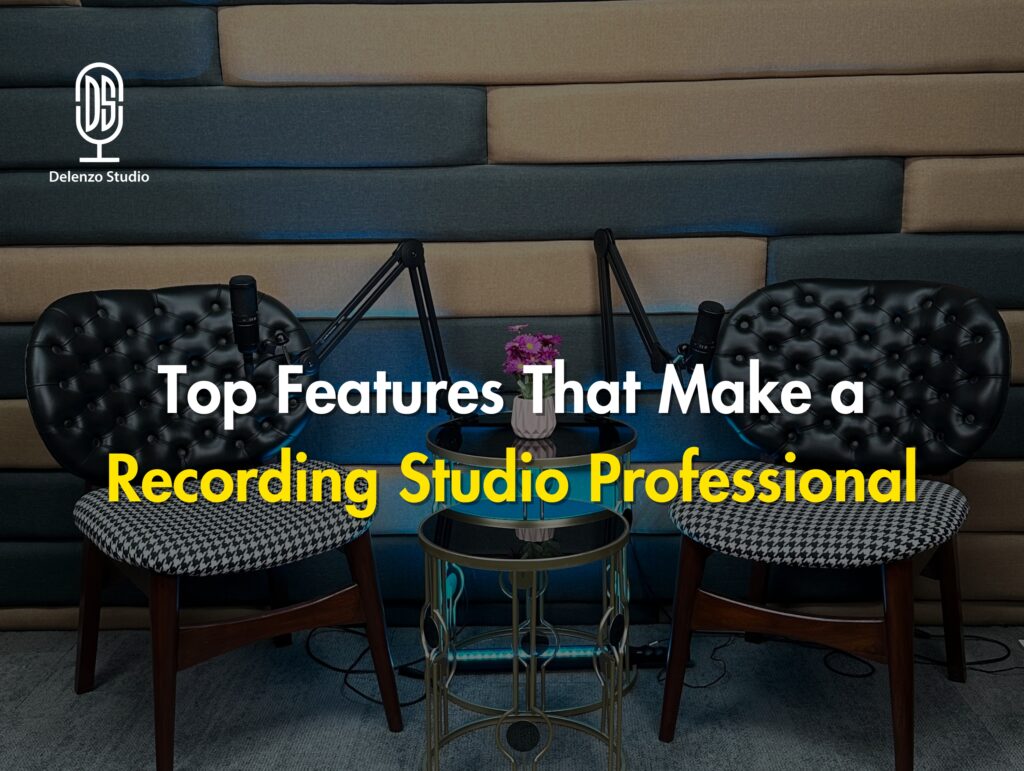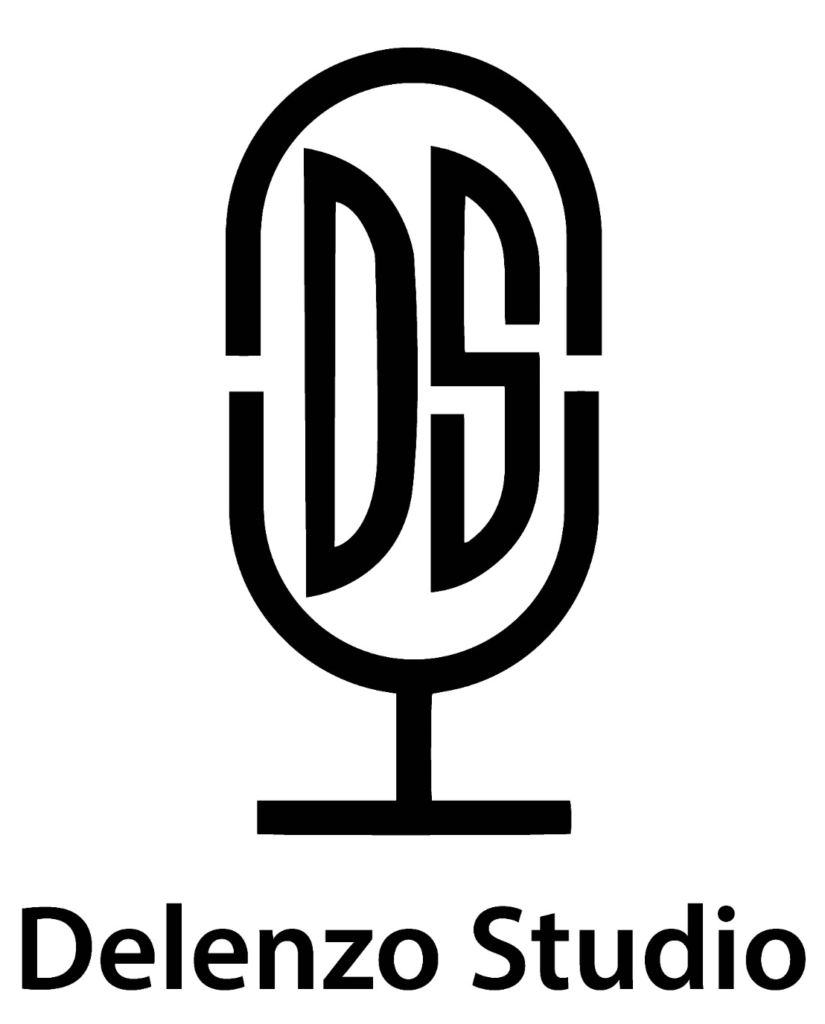
A professional recording studio is not merely a combination of equipment and soundproofed walls. Studios form the backbone of good music, podcasts, voice-overs and so on in the audio production world. The best thing is that a great studio will give one the confidence and space to present the creative vision. Only technology is not good enough to record quality stuff, but it is a conscious blend of design, equipment, skills, and an ambiance that would make you do your best.
Everything, including acoustic panels and powerful editing software, affects your end sound. Likewise, a well-equipped studio provides effective sessions and credible results. With the increasing competition in the media and music industry, professional standards govern which studios become industry favourites.
Ready to make your podcast stand out? Plan your next session with Delenzo Studio and have the experience of a real professional recording!
This guide will provide a breakdown of the key components that make a professional recording studio so that you can know, select or design the ideal space to complete the professional audio work. These features will distinguish studios whether you are a future artist or an engineer or even an inquisitive person.
1. Superior Acoustic Design and Soundproofing
An effective recording studio must have quality sound control. This involves the installation of acoustic panels and bass traps where necessary so as to absorb the additional noise and prevent echoes. By doing this, mics capture clean, true sound. Meanwhile, proper soundproofing is a major factor in preventing external noise, and thus the studio remains silent even when it gets noisy outside. This allows artists and engineers to concentrate and achieve good recordings.
Why Acoustics Matter
Acoustic matters because it minimizes unwanted echoes, reverberations, and standing waves. Since mics grab even tiny sound problems, a room that’s set up right will record audio that’s clean and true. For music and voice professionals, perfect acoustics mean recordings need less correction and sound natural from the start. A professional recording studio always invests in acoustic panels, diffusers, bass traps, and careful room shaping. This setup supports artists and engineers in capturing clean tracks on the first take.
Effective Soundproofing Setup
Soundproofing isolates your sessions from exterior noise. An effective soundproofing setup uses physical barriers—like dense walls, double-glazed windows, and floating floors—to protect each track from city bustle, traffic, or footfall. Of course, a good soundproofing setup also keeps loud production inside, so sessions don’t disturb neighbors. Soundproofing installation, door seals, resistant channels, and layered construction are common in a professional recording studio. This establishes a very much regulated, quiet atmosphere in which details count.
2. High-Quality Recording Equipment
The technical advantage of a professional recording studio is characterized by state-of-the-art recording equipment. Premium microphones suit every vocal and instrumental need. These range from delicate ribbons to robust dynamics. High-quality recording equipment, like audio interfaces, transforms analog sound into pristine digital files, safeguarding every detail.
Mixers and monitors give engineers complete control of each track. This ensures that even the most complex sessions run efficiently. Extra gear, like compressors and EQs, helps fine-tune all the little things and gives you more ways to be creative. You end up with really amazing recording equipment that makes your sound high-caliber, good enough for any studio or broadcast.
Professional Microphones and Audio Interfaces
You can find all kinds of professional microphones to fit different recording needs, like clear condenser mics, strong dynamic mics, and sensitive ribbon mics. Great audio interfaces turn live sounds into digital files while keeping the original sound clean. Since everyone’s voice and instrument sounds different, a recording studio gives you choices to make sure every project gets the right sound. Good brands and updating the equipment regularly help the studio stay ready for any kind of recording.
Advanced Mixing Consoles and Monitors
The mixing consoles, either an analog console or a digital one, are essential in any control room. They provide an engineer with the capacity to fine-tune sounds, find the appropriate volume to sound levels, and transmit the signal where it is required without any difficulty. If you hook them up to good studio monitors, engineers can pick up on every little sound and put together perfect mixes. Walk into any real recording studio, and you’re likely to see top-of-the-line consoles and monitoring setups that give you clear, dependable sound.
Headphones and Outboard Gear
High-quality headphones are crucial for tracking and critical listening. Musicians want to hear themselves clearly so they can play their best. Engineers need to hear a true sound to mix well. Also, good compressors, EQs, and reverbs can really make recordings sound amazing. These tools give you more freedom than just using software, which is why you still see them in top recording studios.
3. Digital Audio Workstation (DAW) and Software
Another core factor is the digital workspace. Today, almost all music and media pass through a DAW before release. Therefore, a professional recording studio runs top-tier software like Audacity and Adobe Audition. These programs include suites of plugins for mixing, mastering, and sound design. Well-performing computers, quick data storage, and backups keep each session running without problems. With this setup, you don’t have to worry about losing stuff you’re working on. The correct digital tools help engineers and clients be more productive.
4. Comfortable and Creative Studio Environment
A well-thought-out studio setup can really help with getting things done and feeling creative. Things like comfy chairs, good lighting, and plenty of space can stop you from getting too tired when you’re working all day. Adding cool art, some plants, and relaxing colors can also help you focus and enhance creative thinking. When you add nice, creative touches to the vibe, like your own decorations and good sound control, it makes the place feel good for anyone who comes in. A real pro recording studio knows that if people feel good and comfy, they’ll do their best work.
Ergonomic Setup
Sitting for hours at a desk or playing instruments means you need furniture and a setup that supports you. Things like chairs you can adjust, good lighting, and how your desk is arranged can really help stop you from getting tired. In a top-notch recording studio, even minor details such as cable routing and the positioning of your monitor are planned out so things run smoothly. This helps keep you creative for longer without feeling uncomfortable.
Aesthetic and Ambiance
Distinctive studio aesthetics promote focus and creative flow. Soft lighting, artistic decor, and custom wall treatments all contribute to the right mood for both artists and staff. Plants, color themes, and even subtle scent choices make the space inviting. Quite often, a professional recording studio uses ambiance to attract repeat clients and set itself apart from dull or cluttered environments.
5. Experienced Sound Engineers and Technicians
Top-notch gear is useless if you don’t have someone who knows how to use it. That’s why professional recording studios have experienced sound engineers and technicians. They make sure your recordings sound great, edit things carefully, and come up with creative solutions to any problems that pop up.
Skilled engineers can quickly adjust to different music styles and personalities. They take care of all the tech stuff, guide the performers, and fix any surprise problems, which lets you concentrate on making music. In podcasting, these professionals ensure every voice sounds clear, balanced, and engaging, giving listeners a polished final product. With pros running the session, your ideas will become reality smoothly and often turn out even better than you imagined.
6. Dedicated Recording Booths and Control Rooms
Purpose-built recording booths in a professional studio offer musicians privacy and excellent sonic isolation. They are ideal for recording crisp vocal or instrumental tracks. These booths are highly optimized to suit all types of music and give a dedicated and distraction-free environment.
The main control room is specifically created in a manner that is transparent and accurate. It comprises state-of-the-art monitoring and mixing equipment. Its ergonomic design gives the engineers the ability to capture, refine, and examine every detail.
Separate Recording Booths
Booths are acoustically treated spaces where vocalists or instrumentalists perform without distraction. They are completely isolating, preventing bleed between performances, and offer the best conditions to both solo artists and group recording. These booths also provide privacy and comfort, which is favorable to natural, emotive performances.
Control Room Design
The control room is where all recording decisions are made. Here, engineers mix, edit, and review tracks using optimal speaker placement and acoustic symmetry. Properly designed control rooms bring accuracy. This ensures that what you hear translates perfectly to any speaker system. Essential for a professional recording studio, the control room is the nerve center of every session.
7. Reliable Power and Backup Systems
Power outages or surges can mess up your data, waste studio time, and ruin expensive gear. That’s why a good recording studio has strong electrical wiring, surge protectors, and battery backups. Having extra power sources and those UPS things keeps recordings going without a hitch and saves your work. Backing up all your recordings quickly and safely ensures your hard work doesn’t go to waste.
8. Client Comfort and Amenities
The vibe of a studio really impacts how well people work and how happy they are. Great studios don’t just have outstanding tools; they also have nice extras that make things easier and more chill. Think comfy places to sit, spots to grab a drink or snack, private bathrooms, and Wi-Fi so you can stay online. Some studios even have green rooms, places to keep your instruments, and safe parking. Basically, if you make people comfortable, they’re more likely to keep coming back. It also helps people do their best work.
9. Post-Production Capabilities
Recording is only half the story. After capturing great audio, the next steps are editing, mixing, and mastering. These processes shape the sound for distribution. A true professional recording studio features isolated editing suites or mixing spaces. It also includes full plugin libraries, noise reduction tools, and calibrated reference monitors. These post-production opportunities let engineers give you the finished product for streaming, radio, or film. Studios usually also have stem mixing, track arranging, and vocal tuning, so everything sounds great when it’s broadcast.
10. Reputation and Portfolio
Finally, the reputation of a recording studio is work-based. A studio with a list of awesome projects in its belt is likely to attract the top artists and ensure the clientele returns. Positive word of mouth is good as well. Presenting completed projects, receiving positive feedback from customers, and leaving a stable track record make a studio appear valid. When you can demonstrate that you are always a quality deliverer, people will trust you to schedule a session. Plus, working with labels, producers, and media companies really puts a studio at the top of the game.
Final Thoughts
A professional recording studio is more than high-end gear: it’s a blend of design, expertise, software, and hospitality. These features are the best and every session is not only a raw track but a breakthrough, creativity, and success that will live way beyond the final mix.
FAQS
Superior acoustic design and soundproofing matter most. High-quality acoustics ensure clean, clear recordings that are free from unwanted noise. This strong foundation allows every instrument, voice, or podcast to sound natural. It makes the final output truly professional and ready for all platforms.
An excellent recording studio has well-cleaned and silent acoustics and up-to-date equipment. Well-trained engineers and a conducive atmosphere also contribute largely. Make sure they have a good portfolio showing off their work. Clear communication of equipment, services and cost is a good indicator of a reliable studio.
Going to a studio for your podcast is a great idea. They have all the good equipment, soundproofing, and tech help you may need. This makes sure your podcast sounds super clear. Plus, studio pros can edit your audio to really grab people’s attention so your podcast gains visibility.
How much a studio session costs in Pakistan depends on what you’re doing, the gear you need, and how well-known the studio is. The length of your session also plays a role. Some places, like Delenzo Studio, have special packages for services like podcast recording and photography. This way, you can pick the services that match what you need and what you can afford.



